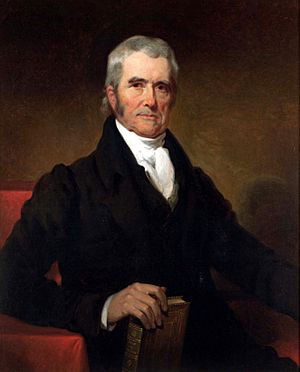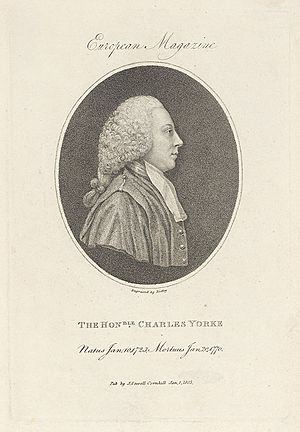Pratt–Yorke opinion facts for kids
The Pratt-York opinion, also known as the Camden-Yorke opinion, was an important legal decision made in 1757. It was created by two top lawyers in England: Charles Pratt, who was the Attorney General, and Charles Yorke, the Solicitor General. This opinion looked at whether it was legal for the British East India Company to buy land from local rulers in British India.
Because of this opinion, India is one of the few countries where the idea of "aboriginal title" (the right of original inhabitants to their land) is not fully recognized in the same way as in some other countries.
Contents
Why the Opinion Was Needed
The British East India Company asked for this legal opinion. The company had been having arguments with army officers. These arguments were about land the company had gained. Some land was bought, and some was taken through fighting.
The opinion was officially announced on December 24, 1757.
What the Opinion Said
The opinion first stated that land taken by the company through conquest (winning in battle) was legally theirs. If the company gained land by defending itself, without the regular army's help, they alone owned that land.
The opinion then explained the difference between land gained by conquest and land gained by agreement or purchase.
- If land was taken by conquest, the British King (the Crown) would gain both control (sovereignty) and ownership (title).
- But if land was gained by agreement or purchase, the King would gain control, but the East India Company would gain ownership.
Pratt and Yorke explained that in India, the King's official document (called a "land grant" or "letters patent") was not always needed for land ownership to be valid. They approved of the company buying land directly from "the Mogul or any of the Indian Princes, or governments."
Chalmers' Summary
A historian named George Chalmers wrote about this opinion in 1814. He explained that English subjects who move to new places carry English law with them. This means that the basic laws of England apply wherever English people set up colonies.
The opinion stated that for places gained by agreement or purchase from Indian rulers, the King's special documents were not needed. The land became the property of the buyers through the Indian agreements. The King still had control over these settlements as English lands and over the people as English subjects.
How It Affected North America

In North America, some people who wanted to buy land were against the Royal Proclamation of 1763. This rule stopped private individuals from buying land directly from Native Americans. These land buyers shared changed versions of the Pratt-Yorke opinion.
These changed versions left out any mention of the East India Company or the Mogul. Instead, they just said "Indian Princes or Governments." This made it seem like the opinion applied to North America too.
For example, a copy of this changed version was found in George Washington's diary. A land buyer named William Murray tried to use another copy to convince a British military leader to let him negotiate with Native Americans.
Later, in 1823, U.S. Chief Justice John Marshall looked at the Pratt-Yorke opinion. He was deciding a case about Native American land rights in the United States. He said that the opinion was about purchases made in the East Indies (India), not America. He pointed out that the opinion used words like "princes or governments," which were used for Indian rulers, not for Native American leaders. He concluded that the opinion did not apply to land purchases in North America.
 | Bayard Rustin |
 | Jeannette Carter |
 | Jeremiah A. Brown |


